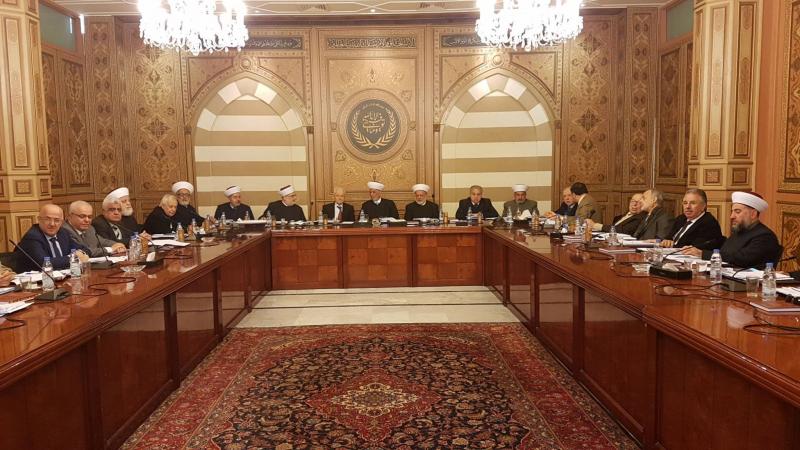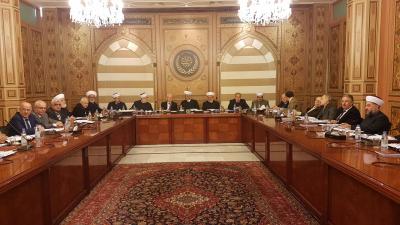The Higher Islamic Sharia Council affirmed that the killing of Sheikh Ahmed Shuaib Al-Rifai is an intentional and heinous crime that warrants just retribution against all who participated in this horrific act. The council urged the competent judiciary to expedite the application of justice to deter anyone from assaulting human sanctity. It also expressed appreciation for the role of military and security agencies in uncovering this crime.
During its regular session at the Dar Al-Fatwa, chaired by the Grand Mufti of the Lebanese Republic, Sheikh Abdul Latif Deryan, the council discussed Islamic and national issues as well as the latest developments in Lebanon. The final statement, read by Captain Mohammad Al-Mourad, indicated that the council "paused at the state’s collapse in Lebanon at the hands of Lebanese officials who say with their mouths what is not in their hearts, managing to transform Lebanon from a secure and tranquil state into a country suffering from hunger and fear for the future and fate."
The council expressed "serious concern over the stalled election of a new president of the republic, whose election should be an entrance to a comprehensive national solution and a basis for the return of stability, reassurance, and trust both domestically and internationally, especially with Arab brothers." It emphasized that "there is no alternative to Lebanon except Lebanon, no alternative to national unity except national unity, and no message for Lebanon except the message of human brotherhood and equality in citizenship based on coexisting together."
In this context, the council called on "parliament and political and party leaders, despite their differences and diversities, to reach a national understanding leading to the election of a president who protects the constitution, genuinely commits to the Taif Agreement, and works to strengthen the bonds of national unity."
It warned against "the policy of exchanging accusations to evade responsibility for the collapse suffered by the Lebanese people in all its segments and regions."
The following is the statement: The Higher Islamic Sharia Council held its regular session at Dar Al-Fatwa, chaired by the Grand Mufti of Lebanon, Sheikh Abdul Latif Deryan, during which it discussed Islamic and national affairs as well as the latest developments in Lebanon, issuing a statement read by council member Captain Mohammad Al-Mourad that included the following text: "The session began with the Fatiha recited for the soul of Sheikh Ahmed Shuaib Al-Rifai, confirming that the killing of Sheikh Al-Rifai is an intentional and heinous crime that requires just retribution against all who participated in this horrific act. The council demanded that the competent judiciary expedite the application of justice to serve as a deterrent to anyone who assaults human sanctity, affirming its appreciation for the role of military and security agencies in uncovering this crime."
The council also addressed the devastating disasters that have befallen the region: the earthquake that claimed the lives of over fifty thousand people in the sister countries of Turkey and Syria, destroying structures and civilizations, as well as the Zionist settlement assault in the West Bank targeting both humans and Islamic and Christian holy sites in Jerusalem and Bethlehem, which destroyed residential clusters in the deprived Palestinian camps.
The Higher Islamic Sharia Council expressed its solidarity with the brotherly Syrian and Turkish peoples, invoking Allah to alleviate the grievous pains they endure and guide them to overcome this catastrophe and its destructive effects. It called for patience and steadfastness for our brethren in occupied Palestine in the face of settlement occupation, praying for divine support to restore their rights and their usurped homeland.
The council paused before the collapse of the state in Lebanon at the hands of Lebanese officials who say with their mouths what is not in their hearts, managing to transform Lebanon from a secure and tranquil state into a country suffering from hunger and fear for the future and fate.
The council strongly denounced the reasons behind the continued harm to Lebanon and its message, insisting on stalling constitutional and national efforts to pull it out of its current situation, which should have seen it as a state deserving of life. It cautioned against sectarian alignments both inside and outside the parliament, viewing this as a regression from Lebanon's identity and message, an abrogation of the will of its citizens to live as one nation.
The Higher Islamic Sharia Council expressed its serious concern regarding the failure to elect a new president of the republic, whose election should serve as an entry point for a comprehensive national solution and a foundation for the return of stability, reassurance, and trust domestically and with the outside, especially with Arab brothers. The council confirmed that "there is no alternative to Lebanon except Lebanon. There is no alternative to national unity except national unity. There is no message for Lebanon except the message of human brotherhood and equality in citizenship based on coexisting together."
In pursuit of this goal, the Islamic Sharia Council calls upon the parliament and political and party leaders, despite their differences and diversities, to reach a national understanding that leads to the election of a president who protects the constitution, sincerely adheres to the Taif Agreement, and works to strengthen the bonds of national unity while relying on it.
The council warned against a policy of exchanging accusations as a means to evade responsibility for the collapse suffered by the people across all its segments and regions. It affirmed that there is no solution except through a unified Lebanese national will. The delay in realizing this national consensus has not previously led to anything other than further fragmentation, failure, and collapse, which Lebanon can no longer bear or afford.
The council stressed that negligence towards the national currency and its purchasing power is a disregard for the citizen's life, dignity, and basic livelihoods. The country is increasingly impoverished and deprived while the revenues of embezzled funds piled up abroad multiply into illegitimate wealth for its owners. Instead of holding these individuals accountable to reclaim the stolen rights of citizens, the deprived face increasing deprivation, while smugglers revel and act with impunity.
It concluded: "Neither the investigation into the Beirut port explosion has come to a conclusion, nor have the rights of depositors been restored to them, nor has there been a genuine and serious attempt to regulate the borders against border crimes, which has increased poverty, misery, and suffering for citizens. This situation turns Lebanon from a state of law and accountability into a stage for committing public crimes without punishment."




